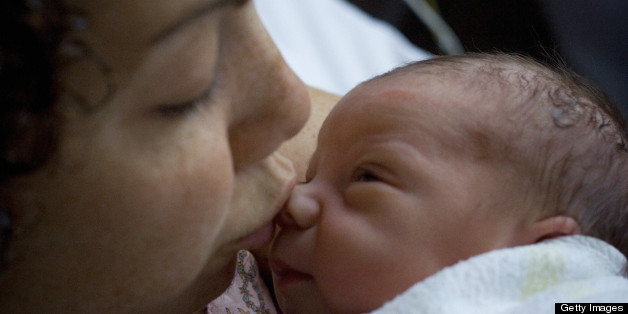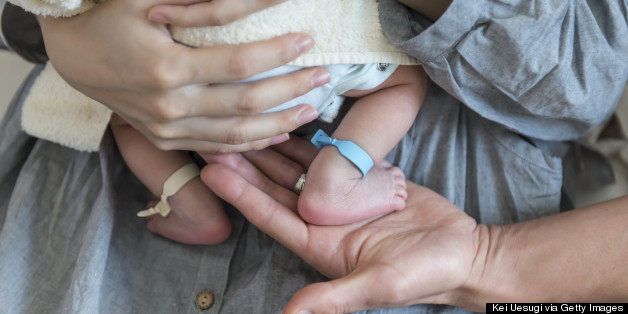this is a great article by the Huff post summarizing key research published about having babies in 2013. While there is so much information out there, it can hard to sift through and process all of it. But having knowledge is power and the key to making the right decisions for you and your family.
But really, keeping up with all the information being thrown at you -- at the same time that you're doing the very hard work of growing your family, or trying to -- can be overwhelming. That's why we assembled this list of eight of the biggest health research findings about preconception, pregnancy and childbirth to come out in the last 12 months -- with the caveat that science is a process and any finding requires replication and verification before it's considered definitive. Because while we at HuffPost Parents support anyone's decision to put their heads down, ear-buds in and do this whole baby-having thing their own way, we also believe that being informed can help parents-to-be make decisions that feel right to them -- in consult with their doctors, nurses, midwives, etc.
So with that in mind, here are just eight of the most interesting things researchers learned about making and having babies in 2013:
1. Sleep and diet can affect fertility.

What makes one couple particularly fertile, while another struggles for months or years to get pregnant is, in many cases, a mystery. And though infertility is often due to factors that are entirely out of a couple's control, more and more research suggests that, in some cases, certain lifestyle factors, like sleep and diet, can make a difference. One study found that women who do shift work (working outside of the typical 8 to 6 framework) may have disrupted menstrual cycles and reduced fertility, while another found that getting between 7 and 8 hours of sleep each night was linked with the best outcomes among patients undergoing IVF. In terms of nutrition, one preliminary study suggested that women with polycystic ovarian syndrome hoping to conceive may benefit from eating a large breakfast and a smaller dinner in order to help with insulin levels, which can affect hormones.
2. Specific fertility treatments lead to more multiple births.

A major report that delved into why the number of twins and other multiples in the U.S. is so much higher now than it was four decades ago found that a third of all twin births, and more than three-quarters of all triplet and higher-order births (i.e. multiples of three or more) were due to the use of some form of fertility treatment. But notably, the report also found that in vitro fertilization -- often singled out as the main culprit -- was, in fact, no longer the greatest contributor to the rate of multiples. Instead, other treatments, such as ovulatory medications, were the top cause.
3. Miscarriage is more common than most people know.

When researchers with Montefiore Medical Center in the Bronx polled a group of more than 1,000 men and women between the ages of 18 and 69, they found that they grossly underestimated how common miscarriage, or the loss of a fetus before the 20th week is: More than half said it occurs in fewer than 6 percent of all pregnancies, but estimates suggest it actually happens in roughly 15 to 20 percent. Moreover, many respondents wrongly identified the major causes, citing stress, oral contraceptives and physical exertion, when, in fact, chromosomal abnormalities are most often to blame. The study wasn't meant to stoke fear, but rather to point out how much misinformation there is about miscarriage, and how that can leave the women and men affected by it feeling very alone.
4. Maternal exercise benefits newborns' brains.

Exercise is, understandably, the last thing on many women's minds when they're exhausted, sick and can't remember the last time they saw their toes, but one study showed that just a bit of moderate exercise (in addition to helping with things like mood and sleep) might also boost babies' brain activity, by contributing to a healthy fetal environment. Babies born to women who clocked at least 20 minutes of moderate cardio three times a week appeared to be better at processing certain sounds, which may have implications for overall brain development. "Our results show that the babies born from the mothers who were physically active have a more mature cerebral activation, suggesting that their brains developed more rapidly," the study researcher told HuffPost.
5. Junk food addiction may start in the womb.

It was a highly preliminary study done in rats, but an investigation out of Australia nonetheless raised interesting questions about what can happen when women eat a significant amount of junk food during pregnancy. Researchers found that rats whose mothers ate diets high in fat and sugar (think sweet cereals and potato chips) had a greater preference for high-fat foods after birth than those whose mothers ate a diet that was low in fat and sugar -- and the gene expression in the reward pathways of their brains was changed, so that they had a greater predisposition to a junk food addiction later in life. Though it's too early to say if the findings can be extrapolated to humans, the study's main researcher argued that the "take-home message for women is that eating large amounts of junk food during pregnancy and while breastfeeding will have long-term consequences for their child's preference for these foods."
6. Pregnancy interventions are common ... and not always welcome.

Despite the fact that roughly 60 percent of moms in the U.S. who were included in a survey about birth practices and beliefs said they feel giving birth is a natural process that shouldn't be interfered with unless it's absolutely necessary for medical reasons. However, one-quarter of the women surveyed said they had at least three interventions during birth, from taking drugs to speed up or start labor to having a C-section. Twenty five percent of respondents who were induced or had an epidural said they felt pressured at the hospital to do so, as did 13 percent of those who had a C-section.
7. Midwifery care is linked to better outcomes.

Most women in the U.S. rely on doctors to provide their primary care during pregnancy and birth, but a growing minority rely on midwives, and a Cochrane review lent some serious support to that model. The review found that consistent midwifery care throughout pregnancy was linked to better outcomes for mothers and their babies, compared to women who saw family physicians, OBs, or some mix of health care providers. Women who worked with midwives had lower rates of episiotomy and epidural useand they were less likely to deliver their baby prematurely. None of the studies cited were conducted in the U.S., but the review's lead author argued that the findings are still relevant in this country.
8. Delayed cord clamping has benefits.

The clamping and snipping of the umbilical cord can be a memorable post-birth moment -- particularly for hands-on fathers and partners -- but an investigation released in 2013 suggests its best done at least a minute or two after the baby is born. The review of 15 previously published trials from around the world found that delaying by just one minute can increase a newborn's iron supplies for up to six months post-birth." article source

